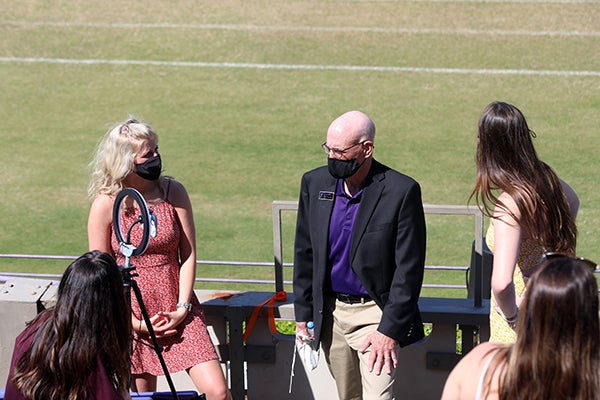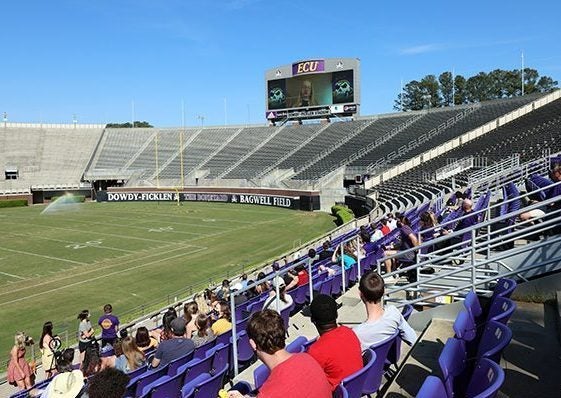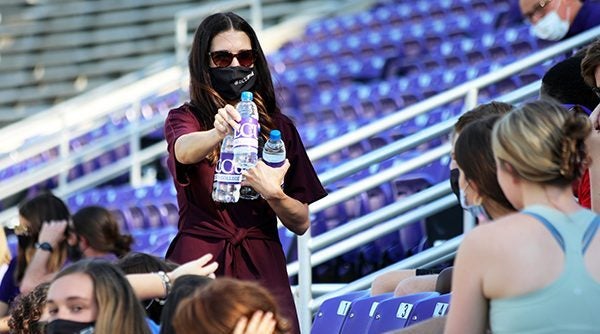Honors freshmen pitch their final projects in Dowdy-Ficklen Stadium
For many college students, this academic year was mostly a virtual experience, especially for freshmen in large, lecture-style classes. This was true for the roughly 200 Honors College freshmen enrolled in the yearlong colloquia for first-year East Carolina University students.
After attending class online all year, the team of six faculty members wanted to celebrate the hard work of students and give them a unique opportunity to see each other in person by hosting the final class of the year in Dowdy-Ficklen Stadium.
“The faculty have made a huge effort in delivering this course online, but we also really miss our students,” said Dr. Tim Christensen, an Honors College faculty fellow. “We wanted to meet them, smile at them and welcome them in person to the end of this difficult year.”

Dean David White, center, addresses the HNRS 2000/3000 students viewing the Instagram Live on April 27. (Photos by Kristen Martin)
In HNRS 2000 and 3000, students work in teams to tackle a problem they see in the world around them using human-centered design thinking to create an innovative solution. The final class of the year is a live pitch where students share what they have worked on throughout the year.
All students were required to produce a video that was played on the stadium’s score/videoboard. Although the in-person component was required, students were encouraged to attend if they felt comfortable doing so, and more than half of the class signed up.
“Being able to have class was an amazing experience and a real taste of what college is actually supposed to feel like,” said Meaghan Skelly, a freshman communication major. “The sense of community within the Honors College has always been strong but today really solidified those relationships that we have made over social media and through a computer screen. I look forward to semi-normal classes next year more than I was before today.”
Students who did not attend in person were able to tune into the livestream hosted on Instagram and coordinated by students Leah Darby and Rylie Warren.
“It was great to finally be able to put faces to names and to see our little community come together,” Darby said. “I had a lot of fun hosting the Instagram live. I was super excited to have an active role in the event.”
The 29 teams tackled a wide variety of issues from providing a way for the homeless population to receive mail and giving a voice to minority voices in Pitt County to pushing for new legislation around sex education and improving college students’ mental health through creative expressions.

Honors College freshmen attended the Live Pitch event in Dowdy-Ficklen Stadium where they watched their classmates’ pitch videos on the score/videoboard.
“I had never seen any of my group members in person until the live pitch, and it was nice to be able to celebrate a challenging semester with them in the same place,” said Lindsey Fleishman, a freshman communication major. “The thing that stuck out to me the most was how much I felt appreciated by the professors. While they spent an entire semester working with us and pushing us, it was much easier to see how much they cared about us in person.”
The faculty team partnered with groups across campus to ensure the live pitch would be a safe, socially distanced event and worked with ECU athletics for stadium access. Allowing students to pitch their ideas in Dowdy-Ficklen Stadium was a must-have experience for both students and faculty.
“We wanted to create an event that allowed us to come together and celebrate making it through 2021 and set the stage for an amazing upcoming fall semester,” said Dr. Elizabeth Hodge, an honors faculty fellow. “The event was created by the faculty through reflective practice and an awareness that our students, families and communities have had a difficult year. We wanted to bring a little joy to their lives and celebrate the courage they demonstrated throughout the year.”
- Tim Christensen, Department of Biology;
- Teal Darkenwald, School of Theatre and Dance;
- Bhibha Das, College of Health and Human Performance;
- Wayne Godwin, School of Art and Design;
- Elizabeth Hodge, College of Education; and
- Gerald Weckesser, School of Art and Design.

Honors faculty fellow Teal Darkenwald hands out water bottles to students in the stadium.
The goal of the freshmen colloquia is to push students outside of their comfort zones and encourage new, innovative ways of thinking.
“The ‘chaos’ of the course is an important feature in helping students learn to live in a world where they need to navigate without knowing and seek failure as the best way to learn,” Christensen said. “We know the class has significant impact on students’ paths forward. We are constantly measuring their growth and have found that they are better at recognizing opportunities, responding to failure, assembling teams, and innovative thinking.”
Visit the Honors College website to learn more about the curriculum.